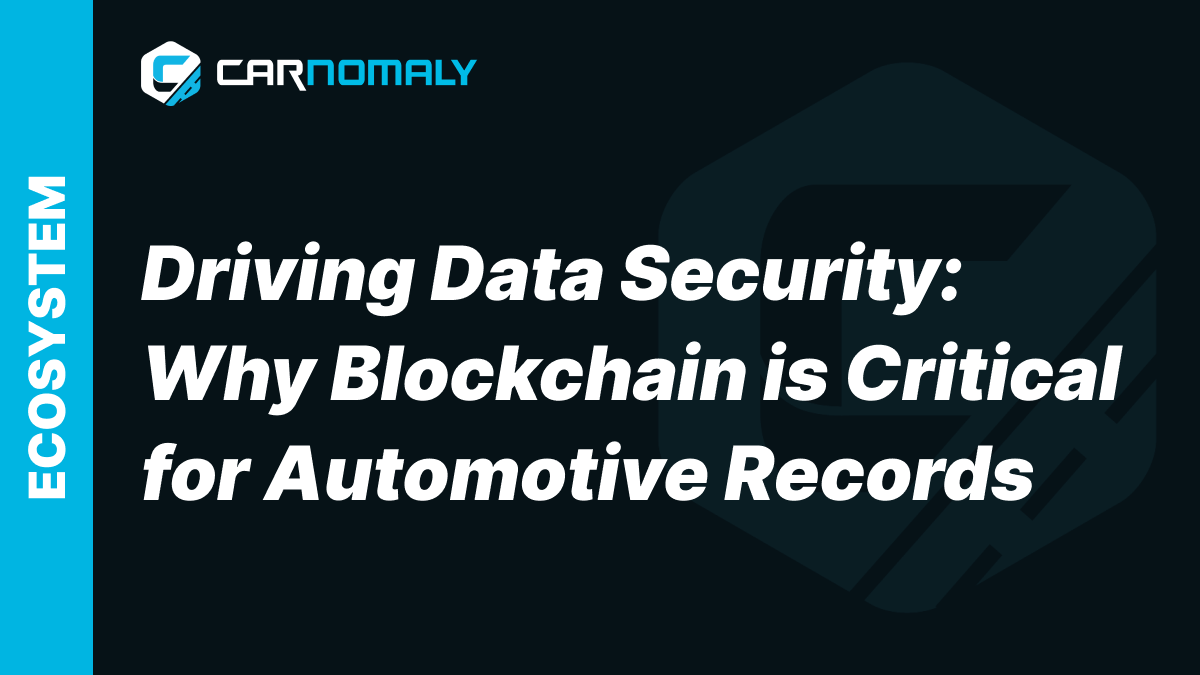The shift to blockchain is not just an upgrade - it’s a necessity for the automotive industry's digital transformation.
In today's digital world, vehicle data plays a crucial role in ownership verification, resale value, financing, insurance, and maintenance. However, the current systems used to store and manage automotive records are fragmented, outdated, and vulnerable to fraud. From odometer tampering to missing service history, these inefficiencies create problems for both vehicle owners and dealerships.
Blockchain technology offers a game-changing solution, providing secure, transparent, and immutable records that revolutionize how vehicle data is stored and accessed. Here’s why blockchain is critical for automotive records and how it ensures unparalleled data security.
The Problem: Gaps and Vulnerabilities in Vehicle Records
Traditional vehicle data systems rely on centralized databases managed by various entities, including government agencies, insurance companies, and dealerships. These databases often operate in isolation, leading to issues such as:
- Data Inconsistencies: Vehicle history reports can be incomplete or inaccurate due to errors in data entry or missing records.
- Fraud and Tampering: Odometer rollback fraud alone costs consumers billions of dollars annually. Inconsistent record-keeping makes it easier to manipulate vehicle data.
- Lack of Transparency: Buyers and dealerships must rely on third-party providers for vehicle history reports, which may not always have up-to-date or verified information.
- Security Risks: Centralized databases are prime targets for cyberattacks, putting sensitive vehicle and owner information at risk.
How Blockchain Solves These Issues
Blockchain technology eliminates these inefficiencies by introducing a decentralized, secure, and tamper-proof system for recording vehicle history. Here’s how:
1. Immutable Records
Blockchain stores vehicle data in a secure, decentralized ledger that cannot be altered or deleted. Every transaction—whether it’s a service update, ownership transfer, or insurance claim—is time-stamped and permanently recorded, eliminating the risk of tampering.
2. Enhanced Transparency
With blockchain, vehicle records are accessible in real-time and verifiable by all relevant parties. Buyers, dealerships, and financial institutions can instantly verify a vehicle’s history, ensuring accuracy and reducing reliance on intermediaries.
3. Fraud Prevention
By preventing unauthorized changes to vehicle data, blockchain drastically reduces odometer fraud, title washing, and other deceptive practices. This protects both vehicle owners and dealerships from falling victim to false information.
4. Decentralized Security
Unlike traditional databases that can be hacked or manipulated, blockchain’s decentralized nature makes it significantly harder for malicious actors to compromise the system. Each transaction is encrypted and linked to the previous one, creating a secure and transparent history of the vehicle.
5. Seamless Integration with IoT
Blockchain can integrate with IoT (Internet of Things) devices, such as onboard diagnostics and GPS trackers, to automatically log mileage, maintenance updates, and performance metrics. This automation further enhances accuracy and security.
CarrChain: Pioneering Blockchain for Automotive Records
CarrChain is set to revolutionize the automotive industry by bringing blockchain-based solutions for vehicle history tracking. By leveraging blockchain’s security and transparency, CarrChain will ensure that dealerships, financial institutions, and vehicle owners have access to accurate and verifiable data. This not only enhances trust but also simplifies transactions, making vehicle sales, financing, and insurance more efficient.
Conclusion
The future of vehicle data security lies in blockchain. By eliminating fraud, enhancing transparency, and ensuring data integrity, blockchain technology is redefining how automotive records are managed. With solutions like CarrChain leading the way, vehicle owners and dealerships will soon experience a new era of trust and efficiency in vehicle data management.
The shift to blockchain is not just an upgrade - it’s a necessity for the automotive industry's digital transformation.


